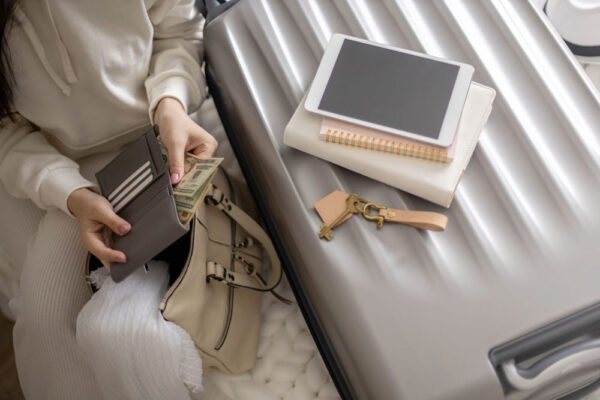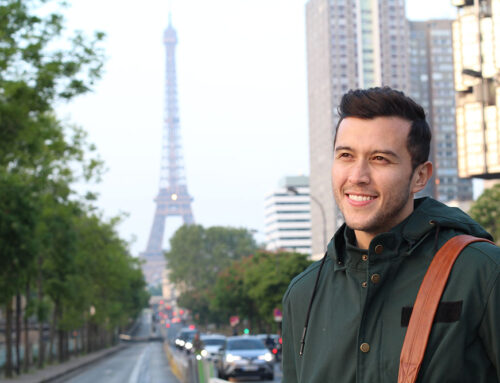Studying abroad is an exciting adventure, one that’s filled with endless possibilities to learn, grow, and explore the world. I know for me personally, when I first studied abroad in Panama years ago, I would never have guessed the doors it would open for me, both through cultural understanding and acceleration of learning the language.
 Studying abroad is a fantastic opportunity. Imagine immersing yourself in new cultures, tasting different foods, and making friends from all corners of the globe. But amidst all that excitement, it’s important to remember one thing: travel safety. For many students, studying abroad is the first time they’ve navigated a foreign environment alone, and being prepared can make all the difference in having a safe and enjoyable experience.
Studying abroad is a fantastic opportunity. Imagine immersing yourself in new cultures, tasting different foods, and making friends from all corners of the globe. But amidst all that excitement, it’s important to remember one thing: travel safety. For many students, studying abroad is the first time they’ve navigated a foreign environment alone, and being prepared can make all the difference in having a safe and enjoyable experience.
This blog will cover personal safety and emergency preparedness for students, and how the right tools, like FoneTrac, can give you peace of mind while you enjoy your study abroad journey. We will include useful links to other websites to help you prepare and further your research before you travel. Let’s dive in!
1. Embracing the Adventure of Studying Abroad
There’s no doubt about it—studying abroad is an adventure like no other. Whether you’re studying art in Florence or marine biology in Sydney, the experience pushes you out of your comfort zone and into a world of discovery. The thrill of it all is amazing, but it also comes with concerns about how to stay safe in unfamiliar places.
Common Concerns Students Face:
- Navigating new cities: Getting lost in a foreign city can be stressful, especially if you don’t speak the language.
- Personal safety: It’s natural to worry about how to protect yourself, especially when it comes to local crime rates or cultural differences.
- Emergency preparedness: What do you do in case of an emergency? Knowing who to call and where to go is crucial.
Suggested Resource:
GoAbroad – Study Abroad Programs and Safety Tips – This website is a great place to start planning your study abroad journey with safety in mind.
2. Understanding Local Safety Norms
Every country has different safety norms. What might be safe back home could be completely different abroad, so it’s essential to do your homework on local laws and customs before hopping on that plane.
Tips for Staying Safe:
- Research travel advisories: Websites like the U.S. Department of State offer up-to-date information on potential risks and areas to avoid.
- Study local laws: Simple things like jaywalking, public drinking, or what you wear can have legal consequences depending on where you are. Know the rules to stay out of trouble.
- Stay aware of local customs: Respecting local customs is key to blending in and avoiding misunderstandings. In some countries, certain hand gestures or types of clothing could draw unwanted attention.
Suggested Resource:
Lonely Planet – Travel Safety Tips – For in-depth tips on how to stay safe in your host country.
3. Effective Communication Strategies
 Staying connected with people back home and your local contacts is one of the best ways to ensure your travel safety. It gives everyone peace of mind, knowing they can reach you in case of an emergency or just to check in.
Staying connected with people back home and your local contacts is one of the best ways to ensure your travel safety. It gives everyone peace of mind, knowing they can reach you in case of an emergency or just to check in.
How to Stay Connected:
- Local SIM cards: Grab one when you arrive to avoid international roaming fees and make it easy to stay in touch.
- Messaging apps: Use free apps like WhatsApp or Signal to keep in contact with friends and family.
- FoneTrac: This app offers real-time location sharing and emergency alerts, so someone always knows where you are. It’s especially helpful in case you get lost or feel unsafe. With its emergency features, FoneTrac can alert authorities instantly.
Suggested Resource:
WhatsApp – Free Messaging and Calls – Download this app to stay connected with friends and family anywhere in the world.
4. Personal Safety Tips for Everyday Situations
Whether you’re out exploring the city or commuting to class, everyday activities require a focus on personal safety. Here’s how to make sure you’re prepared:
Key Safety Tips:
- Stick to well-lit areas: Avoid walking alone at night in dark, isolated places.
- Be mindful of your belongings: Petty theft like pickpocketing is common in many tourist-heavy cities. Keep your valuables close, and consider investing in an anti-theft bag.
- Stay alert in public: Whether you’re using public transportation or attending events, always be aware of your surroundings.
- Carry a personal safety alarm: It’s a small device, but it can make a big difference if you find yourself in an unsafe situation.
Suggested Resource:
Student Universe – Essential student travel safety tips. For more personal safety tips when studying abroad.

5. Health and Emergency Preparedness
When you’re far from home, being prepared for health-related emergencies is crucial. No one wants to think about getting sick or hurt while abroad, but it’s better to be prepared.
Emergency Preparedness Tips:
- Pack a first-aid kit: Include bandages, antiseptic wipes, pain relievers, and any medications you take regularly.
- Know the location of the nearest hospital: It’s smart to identify where you can get medical help as soon as you settle in.
- Apps like FoneTrac: With FoneTrac as your travel safety app, you can access emergency services at the touch of a button. If something goes wrong, you can quickly send an alert to both local authorities and your emergency contacts.
Suggested Resource:
Centers for Disease Control and Prevention (CDC) – Travel Health – For health recommendations and guidelines when traveling abroad.
6. Leveraging Technology for Safety
 Technology is your best friend when it comes to travel safety. There are tons of apps and tools that can help you feel more secure while studying abroad.
Technology is your best friend when it comes to travel safety. There are tons of apps and tools that can help you feel more secure while studying abroad.
Must-Have Tech Tools:
- GPS tracking apps: Apps like FoneTrac allow real-time tracking, so your loved ones always know where you are.
- Emergency alert systems: There are several apps that can alert authorities or contacts in case of emergencies. Having one on your phone can be a lifesaver.
- Destination threat monitoring: Some apps give real-time updates on potential safety risks in your location, like protests, natural disasters, or public health concerns.
Suggested Resource:
Globalsecur – Travel Risk Map (GMS system). Track potential risks in your destination country while family or employees are abroad.
7. Cultural Sensitivity and Awareness
When traveling abroad, understanding the local culture is key not only to having a richer experience but also to ensuring your personal safety. Blending in and showing respect for the customs of your host country can go a long way in helping you avoid trouble.
Tips for Being Culturally Aware:
- Learn key phrases: Even if it’s just basic greetings, learning a bit of the local language can help you make connections and show respect.
- Respect local customs: Some behaviors that are fine at home might be frowned upon or even offensive in another culture. Do a little research to avoid cultural faux pas.
- Engage with locals: The more you learn from locals, the better you’ll understand the culture—and the safer you’ll be.
Suggested Resource:
GoAbroad – Cultural Sensitivity Guide – Learn how to adapt to local customs and engage with the community while abroad.
8. Conclusion: Building a Safety Net Abroad
 Studying abroad is an incredible experience, and with the right preparation, you can ensure it’s a safe one, too. From personal safety tips to using tech tools like FoneTrac, there are many ways to protect yourself and navigate new environments confidently. Remember: college student safety abroad doesn’t mean you need to be paranoid, just prepared. By staying aware, using smart tools, and being respectful of local customs, you’ll be able to fully enjoy your study abroad journey with peace of mind.
Studying abroad is an incredible experience, and with the right preparation, you can ensure it’s a safe one, too. From personal safety tips to using tech tools like FoneTrac, there are many ways to protect yourself and navigate new environments confidently. Remember: college student safety abroad doesn’t mean you need to be paranoid, just prepared. By staying aware, using smart tools, and being respectful of local customs, you’ll be able to fully enjoy your study abroad journey with peace of mind.
For more resources on travel safety, check out FoneTrac, how it works for students studying abroad and see how it can help you stay safe and connected during your study abroad adventure. We wish you happy (and safe) travels to wherever you are going to next!


